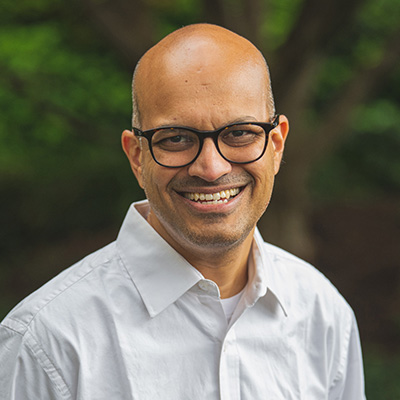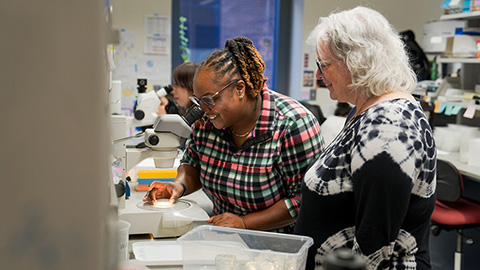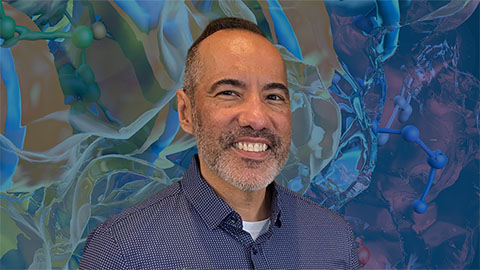Honors for Booker, Girirajan, Llinás
Booker wins research award

The National Organization for the Professional Advancement of Black Chemists and Chemical Engineers honored Squire Booker with the 2023 Percy L. Julian Award, which recognizes and honors achievements in pure or applied science as well as dedication to the scientific research community. The award, named for a Black American researcher who pioneered the chemical synthesis of medicinal drugs from plants, was presented at the organization’s 50th Anniversary Gala and Conference in New Orleans.
Booker is a professor of chemistry, biochemistry and molecular biology at the Pennsylvania State University and a Howard Hughes Medical Institute investigator. His lab studies biosynthetic enzymes that use S-adenosylmethionine and iron-sulfur clusters as radical catalysts. He recently identified the final step and chemical mechanism in the formation of certain membrane lipids found in archaea, the first known biological reaction that couples two completely inert aliphatic carbons.
A member of the American Society for Biochemistry and Molecular Biology for two decades, Booker has led the ASBMB Maximizing Access Committee and served on the Nominating Committee, Meetings Committee, Finance Committee and Program Planning Committee. He established the ASBMB Interactive Mentoring Activities for Grantsmanship Enhancement, or IMAGE, workshop and has been a mentor for the Maximizing Opportunities for Scientific and Academic Independent Careers, or MOSAIC, program. In 2022, he received both the ASBMB Ruth Kirschstein Diversity in Science Award and the ASBMB–Merck Award.
Girirajan awarded Chu professorship

Santhosh Girirajan has been named the T. Ming Chu Professor of Biochemistry and Molecular Biology at Pennsylvania State University.
Girirajan is a professor and interim head of biochemistry and molecular biology at Penn State. His research explores how human genetics contributes to neurodevelopmental disorders such as autism, schizophrenia and congenital malformation. The lab uses techniques such as human genetics, functional genomics in model organisms and computational genomics.
In 2018, Girirajan received the C.I. Noll Award for Excellence in Teaching from the Eberly College of Science Alumni Society. He won the Daniel R. Tershak Memorial Faculty Teaching Award from Penn State in 2015, the Basil O’Connor Award from the March of Dimes Foundation in 2014 and the Young Investigator Award from the Brain and Behavior Foundation in 2014.
T. Ming Chu earned his doctoral degree in biochemistry from Penn State in 1967 and went on to develop a widely used blood test for prostate cancer. He established this professorship in 1997 to provide outstanding Penn State faculty members with resources to further their contributions to teaching, research and public service.
“Santhosh is incredibly deserving of this honor,” Tracy Langkilde, dean of the Eberly College of Science, said. “In addition to his many research accomplishments, he is dedicated to the training and mentoring of our students. We are also grateful for his high level of service to the department and the college.”
Llinás named Pollard professor

Manuel Llinás has been named the Ernest C. Pollard Professor in Biotechnology at Pennsylvania State University. This honor recognizes his outstanding research contributions, teaching and service to the department of biochemistry and molecular biology and the Eberly College of Science.
Llinás is a professor of biochemistry and molecular biology and of chemistry at Penn State. The Llinás lab studies the malaria-causing parasite Plasmodium falciparum to identify ways to disrupt its growth and lifecycle. He is particularly interested in parasite gene regulation and metabolism during the red blood cell stages of parasite development in humans, when clinical symptoms of the disease occur during infection.
Ernest C. Pollard was a physics professor who taught at Penn State from 1961 to 1971 and founded the Department of Biophysics. In 1979, that department merged with the Department of Microbiology and Biochemistry to form the present Department of Biochemistry and Molecular Biology.
Llinás established and is a codirector of the Huck Center for Malaria Research at Penn State, which provides a collaborative forum for researchers at the University Park, Hershey Medical Center and Commonwealth campuses working on malaria and mosquitos. He received a Faculty Scholar Medal for Outstanding Achievement from Penn State in 2021, a National Institute of Health Director's New Innovator Award in 2007 and a Merck Irving S. Sigal Memorial Award from the American Society of Microbiology in 2006.
Enjoy reading ASBMB Today?
Become a member to receive the print edition four times a year and the digital edition monthly.
Learn moreGet the latest from ASBMB Today
Enter your email address, and we’ll send you a weekly email with recent articles, interviews and more.
Latest in People
People highlights or most popular articles

Building a stronger future for research funding
Hear from Eric Gascho of the Coalition for Health Funding about federal public health investments, the value of collaboration and how scientists can help shape the future of research funding.

Fueling healthier aging, connecting metabolism stress and time
Biochemist Melanie McReynolds investigates how metabolism and stress shape the aging process. Her research on NAD+, a molecule central to cellular energy, reveals how maintaining its balance could promote healthier, longer lives.

Mapping proteins, one side chain at a time
Roland Dunbrack Jr. will receive the ASBMB DeLano Award for Computational Biosciences at the ASBMB Annual Meeting, March 7–10, just outside of Washington, D.C.

2026 voter guide
Learn about the candidates running for Treasurer-elect, Councilor and Nominating Committee.

Meet the editor-in-chief of ASBMB’s new journal, IBMB
Benjamin Garcia will head ASBMB’s new journal, Insights in Biochemistry and Molecular Biology, which will launch in early 2026.

Exploring the link between lipids and longevity
Meng Wang will present her work on metabolism and aging at the ASBMB Annual Meeting, March 7-10, just outside of Washington, D.C.
